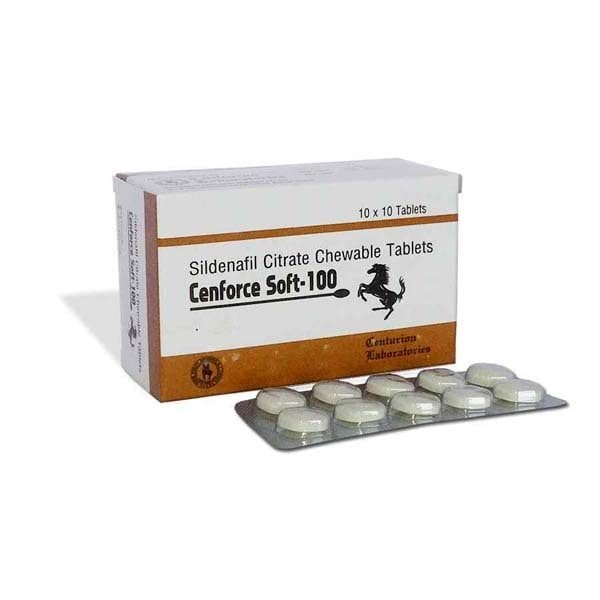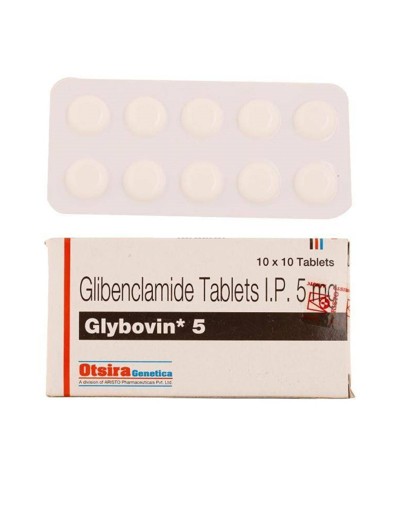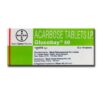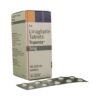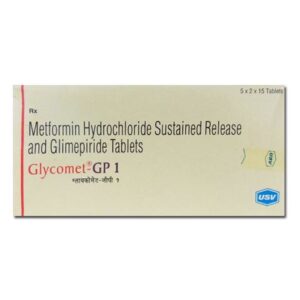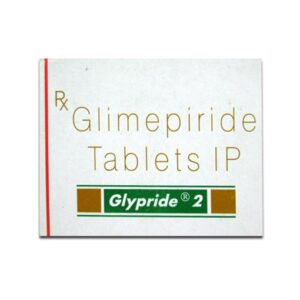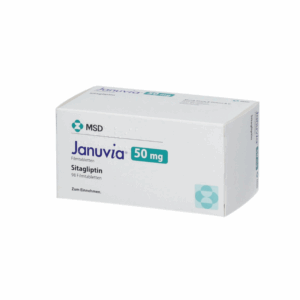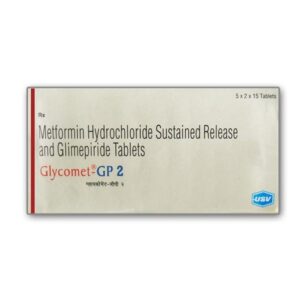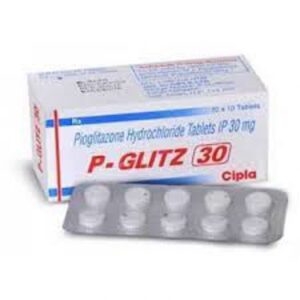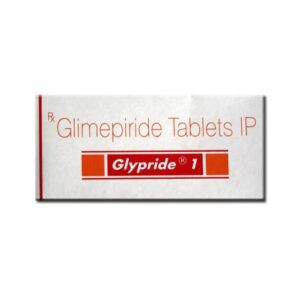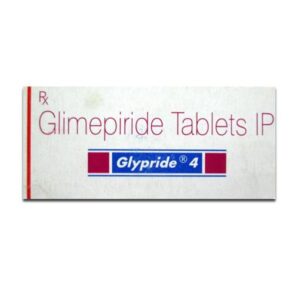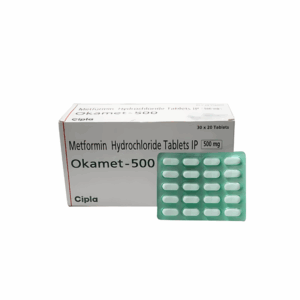GLYBOVIN 5mg Tablet 10’s
$2.00
What is Glibenclamide?
Glibenclamide also known as Glyburide is an oral diabetes medication sold under the trade names Diabeta, Glybuvin (manufactured by Sun Pharma) among a host of other names available worldwide. It is prescribed for the treatment of type 2 diabetes. It is not used for type 1 diabetes
Glibenclamide may also be used for other conditions not listed above.
In Stock
Glybuvin
What is Glibenclamide?
Glibenclamide also known as Glyburide is an oral diabetes medication sold under the trade names Diabeta, Glybuvin (manufactured by Sun Pharma) among a host of other names available worldwide. It is prescribed for the treatment of type 2 diabetes. It is not used for type 1 diabetes
Glibenclamide may also be used for other conditions not listed above.
Important Information about Glibenclamide that you must know
You must not use Glibenclamide (Glybuvin) if you are allergic to its main active ingredient Glibenclamide, or if you are taking bosentan, if you have type 1 diabetes, or if you are in condition of diabetic ketoacidosis.
Before taking Glibenclamide, tell your doctor if you have any allergy from sulfa drugs, if you have been taking isulin or chlorpropamide, or if you are suffering from hemolytic anemia (red blood cells deficiency), an enzyme (G6PD) deficiency, a nerve disorder, or liver or kidney disease.
Glibenclamide can cause hypoclycemia or very low blood sugar, especially if you skip a meal, exercise for too long, consume alcohol, or are under stress. Older adults taking this medication are more susceptible to hypoglycemia. Symptoms of low blood sugar include headache, hunger, weakness, sweating, tremors, irritability, or concentration troubles. Remember to keep some sources of instant sugar handy like glucose tablets, candy, orange juice, or milk. Train your family members and close friends to help you in times of emergency. In case of severe hypoglycemia in which you may not be able to eat or drink, you may have to take glucagon injections. Your doctor will prepare you for an emergency by prescribing you a glucagon emergency injection kit and also train you on how to administer it yourself.
Glibenclamide is classified as FDA pregnancy category C drug which means its effect on unborn baby is unknown if you are taking it during your pregnancy. However, severe hypoglycemia has been observed in babies born to mothers who have taken similar diabetes medications closer to the time of delivery. It is also unknown if Glibenclamide can pass into breast milk and harm your baby. Talk to your doctor about the risks involved if you are pregnant or breast feeding.
Before taking Glibenclamide
Before taking Glibenclamide (Glybuvin), consult your doctor regarding all the points mentioned above. Clear all the doubts you may have about it. It is important that you share your medical history with your doctor before he or she prescribes Glibenclamide.
Glibenclamide and some diabetes medications may increase the risk of serious heart troubles but not taking diabetes can also be damaging to your heart and other organs. Weigh in the pros and cons and talk to your doctor about the risks.
How should I take Glibenclamide?
Take Glibenclamide medication (Glybuvin) strictly as advised by your doctor. Don?t alter the course of the medication in any way, either by amount or by duration. Your doctor may advise you to change the dose sometimes to ensure proper management. All medications come with a patient leaflet. Refer it for more details if you have any doubts or call your doctor or pharmacist.
Glibenclamide is normally taken with the first meal of the day, unless or otherwise directed by your doctor to take it in a different way. While taking this medication, you have to keep a close watch on your blood sugar levels, especially if you skip your meals, exercise more, or drink alcohol. You may also require undergoing several blood tests. Don?t skip any of these tests.
Your Glibenclamide dosage may be altered or temporarily suspended by your doctor if you suffer from some illness, infection, or if you have a scheduled surgery or a medical emergency. However, never change the dosage yourself.
Always be on alert for hypoglycemia and hyperglycemia while taking Glibenclamide as both the outcomes is possible due to this medication. Few common symptoms of hyperglycemia are increased thirst or urination, drowsiness, or blurred vision.
What happens if I forget to take a dose?
If you miss a Glibenclamide dose, take it as soon as you remember it. However, skip the missed dose if the time to take the next dose is near. Don?t take extra medication or two doses near to each other to compensate for the missed dose.
What happens if I overdose?
Overdosing on Glibenclamide can lead to unpleasant outcomes like hypoglycemia. Seek emergency medical help or call the?Doctor immetiately?in case of an overdose. You may experience symptoms of severe hypoglycemia such as severe weakness, blurred vision, sweating, speech troubles, shaking, stomach ache, confusion, or seizure.
What should I avoid while taking Glibenclamide?
Avoid alcohol while taking Glibenclamide as it lowers blood sugar level thereby interfering with the medication. Also avoid unnecessary exposure to sunlight or tanning beds. Glibenclamide may increase the chances of sunburn greatly. Wear proper clothing and put a good sunscreen when out in sun.
Glibenclamide Side Effects
Stop taking Glibenclamide medication and seek emergency medical attention if you experience an allergic reaction to it like skin hives, swelling in face, lips, mouth or tongue, or breathing trouble.
You may also witness some serious side effects of Glibenclamide such as dark urine, clay colored stools, jaundice, nausea, stomach pain, low fever, pale skin, confusion, overall weakness, easy bruising or bleeding, purple or red spots underneath skin, headache, concentration troubles, memory problems, feeling unbalance, hallucinations, fainting, seizure, shallow breathing or difficulty in breathing that stops.
Glibenclamide use has some common and less serious side effects like mild nausea, heartburn, feeling full, joint or muscle pain, vision blurriness, or mild itching or skin rash.
These are not a complete set of side effects which you may experience due to Glibenclamide (Glybuvin) usage. There may be other side effects. Discuss about the side effects with your doctor.?
Glibenclamide Dosing Information
Your doctor will fix your Glibenclamide dosage after a proper examination of your conditions. Dosage depends on a number of factors like seriousness of your condition, age, sex among a host of other factors. You must strictly and obediently follow your doctor?s advice for best results.
Interaction with other drugs
Some of the drugs which may interact with Glibenclamide are cyclosporine; a blood thinner such as warfarin; fluconazole; fluoxetine; rifampin; an ACE inhibitor such as enalapril, lisinopril,or ramipril; or some antibiotics like ciprofloxacin, levofloxacin, or others.
You may not notice low blood sugar or find it tough to figure out low blood sugar if you take these medications along with Glibenclamide: clonidine; albuterol; or beta blockers like atenolol, metoprolol, carvedilol, propranolol, and others.
You may get hyperglycemia (high blood sugar) if you take Glibeclamide with these medications: diuretics; isoniazid; steroids; birth control pills and other hormones; diet pills or medicines to treat asthma, colds or allergies; thyroid medicine; niacin; or phenothiazines.
You may get hypoglycemia (low blood sugar) if you take Glibenclamide with these medications: exenatide; some nonsteroidal anti-inflammatory drugs; aspirin or other salicylates; exenatide; sulfa drugs; a monoamine oxidase inhibitor; other oral diabetes medications like acarbose, metformin, miglitol, rosiglitazone or others.
These lists of drugs which can interact with Glibenclamide (Glybuvin) are non exhaustive and there may be other drugs which can interfere with this medication?s functioning thereby increasing or reducing its effects of lowering your blood sugar level. Let your doctor know about all medications you use, prescribed or OTC or herbal products beforehand for proper prescription. Don?t start a new medication without doctor?s advice.
Related products
Diabetes
Diabetes
Diabetes
Diabetes
Diabetes
Diabetes
Diabetes
Diabetes

